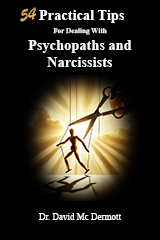- Home
- What is Narcissistic Personality Disorder?
- Narcissist meaning
- Healthy narcissism
Is There Such A Thing As Healthy Narcissism?
Healthy narcissism seems a bit odd to many people. Narcissists are supposed to have huge egos, want to be the center of attention, crave praise and adoration, can be very abusive and are generally a nightmare to live with.
Yes, malignant narcissists are indeed like this. They can seem to have buckets of self-confidence, a high self esteem, make decisions with little or no fear, can take risks and are charismatic enough that they can even get others to do things for them.
This second list of things seems like a great set of characteristics for a leader. And nowadays, these things are highly valued in our society. The problems start when a narcissist tricks his way into a position of power and then his true nature becomes obvious. Things are done for his own gain, to the detriment of everyone else.
Perhaps someone decided that the leadership characteristics are truly desirable, but it's possible to have a healthy dose of them. And they called it healthy narcissism.
Ok, maybe that's a little facetious, but to say that pathological narcissism is just too much healthy narcissism is to misunderstand both conditions.
Are we all narcissistic?
We all like to be complimented, to feel good about ourselves and to have those around us acknowledge every now and then that they like us for who we are. It gives our self-esteem a little boost and often gives us the energy to continue in our lives a little lighter and a little happier.
It's often noted that those with high self esteem and self confidence are considered to be happier and more successful in various aspects of their lives.
The Narcissistic Personality Inventory is used to measure narcissistic traits in people. It is not, however, a diagnostic tool for narcissistic personality disorder.
Childhood
Many psychologists agree that children go through a narcissistic phase, where life is all about them, their own needs and wants, where they want to influence the world around them and they seek instant gratification.
Compliments and praise, as well as criticism, from their parents help them to establish a healthy sense of self. Too much criticism, or too much praise, can create a flawed sense of self.
Around the age of 8, they are much more aware of the difference between self and other and the sense of self continues to mature based on this awareness.
Later on
This healthy narcissism allows the adolescent to have a healthy self-esteem, where they are aware of their own self-worth and believe they deserve respect. This allows them to navigate these difficult years to become adults that can adapt to the normal ups and downs in relationships and in life.
They are self sufficient and at the same time, comfortable in intimate relationships. They have enough 'self-love' to feel equal in relationships and to be able to love others.
Healthy narcissism - taking care of yourself?
Most people will consider being careful with your diet, doing regular exercise, paying attention to your appearance, setting realistic goals, and being kind to yourself and others as a good way to live.
Whether you call it taking care of yourself or healthy narcissism, the results are pretty much the same.
Narcissistic personality disorder
This healthy aspect is in stark contrast to the emotional vampires who viciously exploit others for their personal gain through their narcissistic behaviors...
As I mentioned, there are those who claim that pathological narcissism is just an excess of healthy narcissism. I would question their motives. Why are they trying to make it seem that a condition that is recognized by psychiatrists as definitely problematic is somehow acceptable? Are they narcissists themselves? Why else would someone try to normalize the behavior of people who lie, cheat, abuse, rape, con and otherwise destroy the lives of others.
Those who have a healthy level of narcissism have feelings, they have empathy, they have normal relationships with others. Those with narcissists personality disorder have none of these things. Their relationships are based on Their self esteem is derived from personal gain, power or pleasure. By definition they are incapable of mutually intimate relationships.Their ability to recognize or identify with the feelings of others is impaired. These are not normal characteristics and it is not right to try to claim that these things are simply an excess of something.
Like this page?
Don't wait.
Get help now.
If you're trapped in an abusive relationship, struggling with the impact of a cult, or worried about someone you love, you need answers and support today.
Reach out to me via the Contact page.
We'll talk, create a plan and take the first steps to freedom. Compassionate, judgement-free guidance and personalized strategies. Your privacy is 100% protected.
Available now!

54 Practical Tips For Dealing With Psychopaths and Narcissists
You have the theory but how do you actually apply it? This book spells it out...
Dealing With Psychopaths
Free monthly newsletter with practical tips and ideas to help you understand and navigate the chaos that they cause!